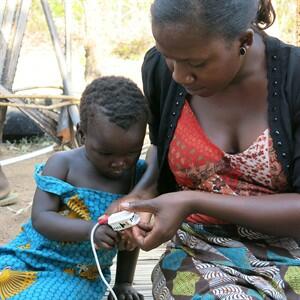
The cooking and Pneumonia Study (CAPS) has reached another significant milestone with 3,500 children under the age of five now recruited to the study. The trial will track around 10,000 children in randomised villages in Chikhwana and Chilumba in Malawi to measure the effects of an advanced cookstove intervention on health outcomes.
Senior Clinical Lecturer at LSTM, and Honorary Consultant in Respiratory Medicine at Aintree University Hospital, Dr Kevin Mortimer is co-principal investigator for CAPs and is also looking at the importance of clean air to lung health a little closer to home.
May sees the start of the national Laser trial. The trial is managed on a national level by Professor Anoop Chauhan from Portsmouth Hospitals NHS Trust, and the study, involving 50 volunteers, at Aintree will be led by Dr Mortimer.
The trial will test out a pioneering new non-invasive non-drug treatment for patients with severe asthma called Airsonett. Airsonett is a machine that is fitted in the bedroom and cleans the air of allergy particles overnight, allowing patients to clean air which will rest their lungs. Laser will look at whether Airsonett will reduce asthma attacks and lead to other improvements for patients with asthma.
The trial in Aintree will look at 50 volunteers over the course of a year and will be allocated to over 18 year-olds on a first come first served basis.
Dr Mortimer is enjoying his role in both Aintree and Malawi: “These two studies are being conducted in very different settings, with very different interventions, but they have in common the concept that clean air is important to lung health. Recent figures from the WHO show that air pollution (including cigarette smoke, outdoor and indoor air pollution together) is responsible for around 13 million deaths globally.”
For more information about signing up to the Laser trial, please contact Ann Murphy at Aintree NHS Trust ona.murphy@aintree.nhs.uk or 0151 529 5886.